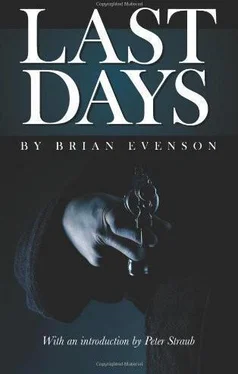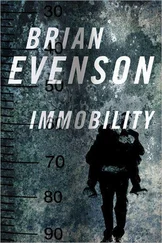The fingertip was pale and puffy, streaked dark at the end, a sort of red collar just below the cut.
"It's infected," said Kline.
"Nonsense," said Borchert. "What you see is simply the body sealing itself off."
"About the room-"
"I can see the appeal of self-cauterization, Mr. Kline," said Borchert. "Ugly, true, but you really do have something there. Less clinical. A return to natural religion, so to speak."
"I don't have anything," said Kline. "This has nothing to do with me."
"Oh, but it does, Mr. Kline. You may be an unintentional avatar, but you are an avatar nonetheless."
"Look," said Kline. "I'm done with this. I'm leaving."
"So sorry, Mr. Kline," said Borchert. "But we've talked about this. If you try to leave, you'll be killed. Now what was this about the room?"
Kline shook his head. "Nobody was killed in that room."
"What room?"
"The murder room."
"Oh," said Borchert. "I see." He used his arm to raise himself out of the chair and onto his remaining leg and then stood there, half gone. He stood tilted slightly in the direction of his absent limbs, as if crimped at the side, for balance. "How can you be so sure, Mr. Kline?"
"Everything is wrong," said Kline. "The blood spatter pattern is irregular, the positioning of the body isn't right in regard to blood flow-"
"But surely, Mr. Kline, irregular doesn't mean falsified. Perhaps it's simply an unusual circumstance."
"Perhaps," said Kline. "But there's something wrong with the blood."
"The blood?"
"It isn't completely dry."
"But surely-"
"It's been artificially dried. A fan or a hair dryer or something. But it's still damp underneath. It couldn't possibly belong to the body of a man killed several weeks ago."
Borchert looked at him thoughtfully a long moment and slowly hopped his way around so he could slide back into the chair.
"Well?" said Kline.
"So it's a reconstruction," said Borchert. "So what?"
"So what?" said Kline. "How can I be expected to solve a crime by looking at a reconstruction of it?"
"Mr. Kline, surely you're enough of an armchair philosopher to realize that everything is a reconstruction of something else? Reality is a desperate and evasive creature."
"Am I being asked to solve the crime or the reconstruction of the crime?"
"The crime," said Borchert. "The reconstruction," he said, gesturing to himself with his thumb and his one and two-thirds fingers, " c'est moi ."
"I can't get anywhere without real evidence."
"I have perfect faith in you, Mr. Kline."
"At least let me talk to a few people who might know something."
"Somewhat tricky," said Borchert. "But, ever the optimist, I'm convinced something can be arranged."
Shaking his head, Kline went toward the door. Once there he turned, saw Borchert smiling in his chair. When he smiled, Kline realized that all his bottom teeth had been removed.
"This is going well, don't you think?" said Borchert, speaking loudly, perhaps for the sake of the guard. "Thank you, dear friend, for stopping by."
Ramse showed up a few days later with a tape recorder balanced on his forearms. He put it on the table near Kline.
"What's this for?" asked Kline.
"It's a tape recorder," said Ramse. "For taping things. Borchert asked me to bring it."
"What does he want me to do with it?"
"It's for the interviews," said Ramse. "For the crime."
Kline nodded. He went to the fridge and poured himself a glass of milk, drank it slowly as Ramse watched.
"Anything else you need?" Kline asked.
"No," said Ramse. "Just that."
Kline nodded. "Right," he said. "Where's Gous?"
"He's getting ready for the party."
"The party?"
"Didn't he send you an invitation?"
"No."
Ramse furrowed his brow. "An oversight," he said. "He'd want you to come. I'm sure he wants you to come. Will you?"
Kline shrugged. "Why not?" he said.
"It's settled then," said Ramse. "I'll pick you up at eight."
Kline nodded, looked absently at his watch. Until the accident, he had worn his watch on his right arm, but now if he wore it there it threatened to slide off the stump.
Across the table, Ramse cleared his throat.
"You're still here?" asked Kline.
"Shall I wait outside or would you rather I came back later?" asked Ramse.
"For the party?"
"You don't understand," claimed Ramse. "I'm supposed to take the tape back."
"But I haven't conducted any interviews yet."
"That's what the tape's for."
"Right," said Kline. "To tape the interviews."
"No," said Ramse. "To tape the questions."
"To tape the questions?"
Ramse nodded. "These people," he said. "They're all ten or above. You're a one. You can't see them in person."
"But I see Borchert."
"Borchert's the exception," said Ramse. "You see him when someone above a ten has to be seen. If you were a three or a four some might condescend to see you, but they won't see a one. Not even a self-cauterizer."
"Jesus," said Kline. "That's ridiculous."
"I've been instructed by Borchert not to listen to the questions," said Ramse. "I'm only an eight. I don't need to know everything. I'm to take the tape back to Borchert once you've finished recording. Would you like me to wait in the hall or would you prefer I come back later?"
He sat staring at the tape recorder. It was ridiculous, he knew. Perhaps Ramse was right, it was only a question of proper behavior, no ones among the tens, but why in that case even bring him in at all? Why not solve their murder on their own?
He went and opened the door. Ramse was there, waiting, leaning against the wall. Kline closed the door again.
What were his options? One: he could refuse to send the tape back. Borchert would hardly allow that. He would be punished in some way, he was certain. And it would only prolong the amount of time he would have to spend in the compound. Two: he could send back a blank tape. Same problem: it bought him a little time, but time for what? Three: he could send back a series of questions.That had the advantage of moving things forward, or at least of moving them in some direction.
He sighed. He went to the table and pressed the record button.
"One: State your name and your relation to the deceased.
"Two: Where were you on the night Aline was murdered?
"Three: Do you know of anyone who might want Aline dead for any reason?
"Four: Did you see the body? If so, please describe in detail what you saw.
"Five: Are you absolutely certain Aline's death wasn't a suicide?
"Six: Did you kill Aline?"
It was ridiculous, but at least it was a start. They would tell him nothing, he was almost sure. He turned the tape off.
Ramse showed up at eight o'clock sharp, wearing a tuxedo that had been modified to better reveal his amputations, no shoes, no socks. He had, slung over one arm, a plastic dry cleaner's bag containing another tuxedo, which he handed to Kline.
"Try this on," he said.
Kline did. It was a little loose but generally fit quite well, the right sleeve cut back slightly to reveal his stump.
They walked across the gravel lot in front of the house, following the road toward the gate, turning down a footpath after about a hundred meters. At the end was a gravel circle, a bar to the left, a neon one-legged woman on the sign. A well-lit lodge structure was to the right, which was where they went.
A one-handed man was standing at the open door, smiling. Kline could hear music blaring from the door behind him.
"Hello, Ramse," the man said affably. "This the guy?"
"This is him, John," said Ramse. "In the flesh."
They both laughed at that for some reason. The man held out his remaining hand, his right. "Put it there," he said, which Kline tried, left-handed and very awkwardly, to do.
Читать дальше












